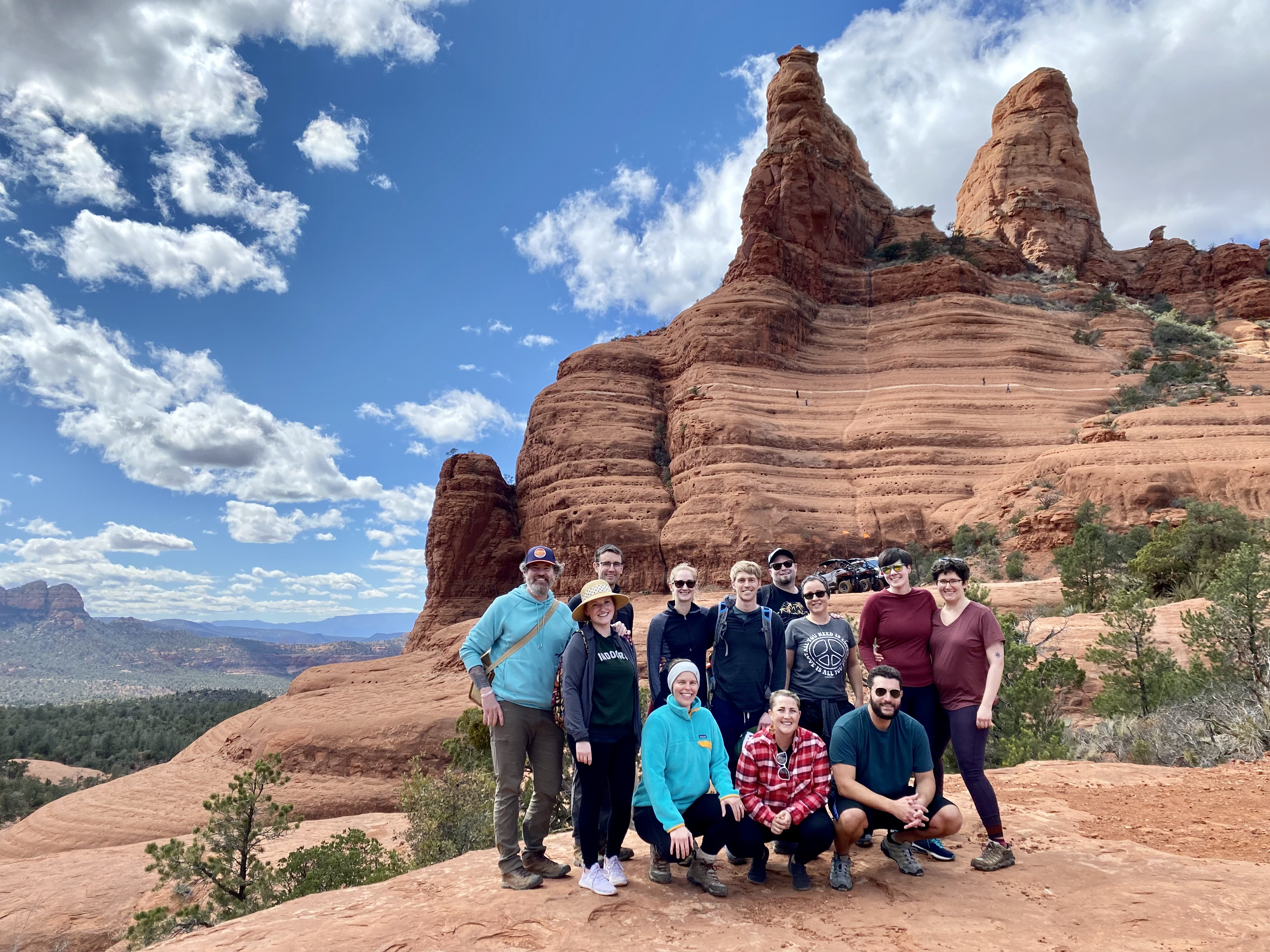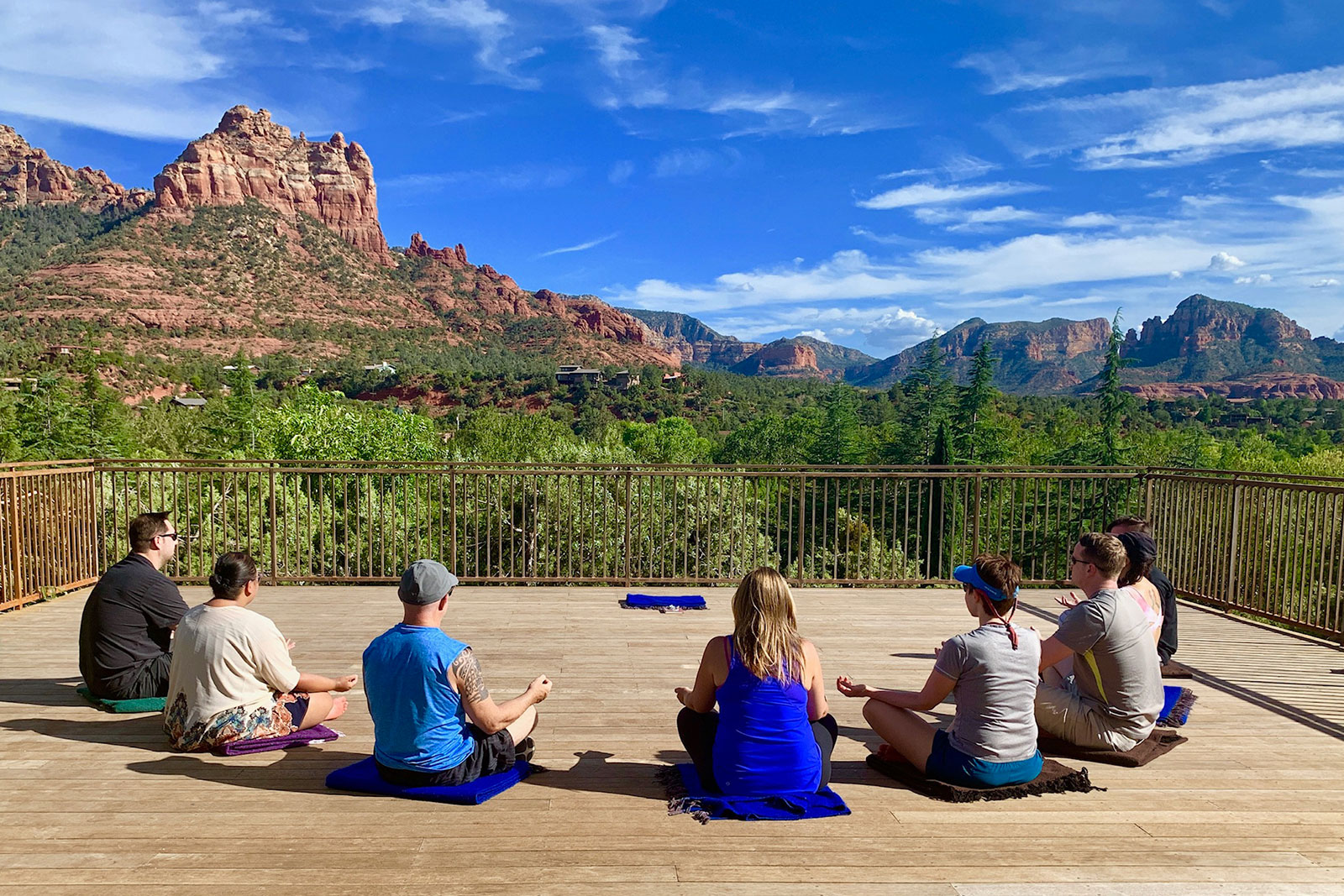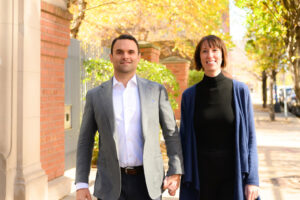Cancer undoubtedly leaves both visible and invisible marks on the person experiencing it. And what about their romantic relationship? Partners often take on challenges alongside their loved one facing cancer and must navigate the new realities of caregiving. In turn, cancer can significantly disrupt the existing relationship dynamic. These romantic partnerships impacted by the cancer experience can benefit from dedicated support.
Breathe Now Wellness Retreats, offered by Dear Jack Foundation, aim to create intentional healing experiences for young adult cancer survivors (ages 21–39) and their romantic partners. At the retreats, couples learn methods to nurture their relationships and maintain a meaningful life together after cancer treatment has ended. Cancer survivors and their partners can use this opportunity to process the cancer experience as a team and reconnect on their shared values as a couple.
Kayla Fulginiti, a licensed clinical social worker and director of programs at Dear Jack Foundation, explains that individuals often feel pressure to “get back to normal” after cancer treatment has ended. In reality, a cancer survivor and their partner have both experienced trauma that deserves ample time and attention for healing. Breathe Now retreats aim to allow this additional time to refocus on quality of life and relationship challenges for cancer survivors and their romantic partners.
Jaclyn Austin Lofstrom, a breast cancer survivor, and her husband, Bobby Lofstrom, recently participated in a Breathe Now retreat in Sedona, Ariz. Jaclyn had first heard about the program from a friend, and the couple had originally planned to attend a retreat in the spring of 2020. Although the retreat was delayed due to the coronavirus pandemic, both Bobby and Jaclyn confirm that it was well worth the wait.
“I had this feeling that I was supposed to go ‘back to normal’ after cancer treatment was over,” Jaclyn explains.
She quickly realized, however, that post-treatment life has its own unique challenges. One of the most significant takeaways from the Breathe Now retreat for her was knowing that she wasn’t alone in navigating the ups and downs of survivorship. Until the retreat, Jaclyn says, she hadn’t found much support that was specifically tailored to this phase of the cancer experience.
Bobby and Jaclyn explain that coming together with fellow survivors and their partners in the young adult age group was incredibly important. Bobby adds that he especially appreciated connecting with other partners at the retreat.
“No one else really understands what you go through as a couple, so meeting other people in similar situations was so helpful,” he says.
The intended goal for Breathe Now participants isn’t to achieve perfection in life or in their romantic relationship, Fulginiti notes. Rather, the retreats strive to give these couples the appropriate tools to navigate various challenges that arise throughout life, particularly for those who have been through cancer. This way, rather than setting unrealistic standards for a conflict-free relationship, the couple can accept their realities together and learn how to work through future difficulties.
We hope that they leave with a sense of their path together and tools to get there.
The four-day retreats welcome six couples and are supported by a staff including mental health professionals (licensed clinical social workers and/or psychologists), trauma-informed yoga and meditation facilitators and nutrition specialists. The retreat participants come together at beautiful resorts to enjoy a fully immersive experience. Four Breathe Now Wellness Retreats are taking place in 2022, including Sedona, Ariz.; Highlands, N.C.; and two retreats in San Diego, Calif.
Activities at the Breathe Now retreats include breathwork and mindful movement practices, meditation, nutrition support and group psychosocial workshops. Combined, these interventions aim to promote healing for both mind and body for each individual as well as each couple as a unit.
Jaclyn and Bobby appreciated the range of activities offered at their Sedona retreat, in addition to excellent facilitators and a highly engaged group of participants. “Everyone showed up and gave it their all,” Bobby shares. And although many of the activities promoted relaxation and stress relief, Jaclyn notes, the psychosocial workshops in particular involved “a lot of working on ourselves.”
Themes addressed at the retreats include identity, strength and balance, Fulginiti notes. The identity focus is particularly engaging, as young adults often experience abrupt identity shifts and role changes while going through cancer treatment.
During this time, couples may have different household responsibilities, daily routines and family roles. Additionally, existing concepts of purpose and values both individually and as a team can feel disrupted by cancer. Support offered at the retreat helps couples examine these changes and determine what works best for their partnership going forward.

Fulginiti shares that sexual and emotional intimacy is another popular theme that typically arises in the retreat workshops, as cancer treatment can create new challenges for sexual health, body image and emotional connection.
The retreat’s various partner activities include creative communication exercises as well as mindful partner movement and breathing practices. These activities help rekindle emotional and physical connections for each couple so that they feel comfortable addressing changes and challenges to the sexual component of their relationship.
Thanks to the retreat, Bobby explains, he and Jaclyn have a better understanding of each other and their values as a couple. Going forward, he says, “Our story doesn’t have to focus on what cancer prevented us from doing. We can shift perspective.” Jaclyn adds, “We have new tools to talk to each other and move forward as a couple.”
Ultimately, Fulginiti says, the goal is for couples to leave the retreats “with tangible interventions for day-to-day practices” they can integrate into their partnership going forward. “We hope that they leave with a sense of their path together and tools to get there,” she says.
Jaclyn and Bobby say that since returning home from their Sedona retreat, they have implemented many of their new tools and strategies into their everyday life both as individuals and as a couple, including yoga and meditation, shared physical activities and mindful eating. “Every [couple] should be able to do something like this after going through cancer,” Jaclyn says. “It’s so needed.”
The Dear Jack Foundation provides impactful programming that directly benefits adolescents and young adults (AYA) diagnosed with cancer in order to improve their quality of life and create positive health outcomes from treatment to survivorship for patients and their families. Learn more at www.dearjackfoundation.org.







